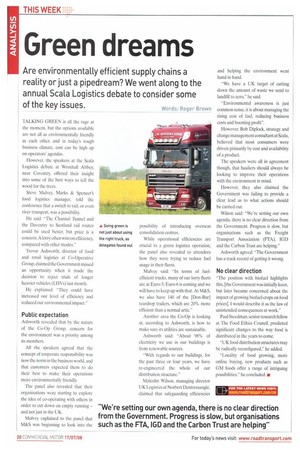Green dreams
Page 20

If you've noticed an error in this article please click here to report it so we can fix it.
Are environmentally efficient supply chains a reality or just a pipedream? We went along to the annual Scala Logistics debate to consider some
of the key issues. Words: Roger Brown TALKING GREEN is all the rage at the moment, but the options available are not all as environmentally friendly as each other, and in today's tough business climate, cost can be high up on operators' agendas.
However, the speakers at the Scala Logistics debate at Wroxhall Abbey, near Coventry, offered their insight into some of the best ways to tell the wood for the trees.
Steve Mulvey, Marks & Spencer's food logistics manager, told the conference that a switch to rail, or even river transport. was a possibility.
He said: -The Channel Tunnel and the Daventry to Scotland rail routes could be used better, but price is a concern. A lorry often wins on efficiency, compared with other modes."
Trevor Ashworth, director of food and retail logistics at Co-Operative Group, claimed the Government missed an opportunity when it made the decision to reject trials of longer heavier vehicles (L1-IVs) last month.
He explained: "They could have increased our level of efficiency and reduced our environmental impact."
Public expectation Ashworth revealed that by the nature of the Co-Op Group, concern for the environment was a priority among its members.
All the speakers agreed that the concept of corporate responsibility was now the norm in the business world, and that customers expected them to do their best to make their operations more environmentally friendly.
The panel also revealed that their organisations were starting to explore the idea of co-operating with others in order to cut down on empty running and not just in the UK.
Mulvey explained to the panel that M&S was beginning to look into the possibility of introducing overseas consolidation centres.
While operational efficiencies are crucial to a green logistics operation, the panel also revealed to attendees how they were trying to reduce fuel usage in their fleets.
Mulvey said: "In terms of fuelefficient trucks, many of our lorry fleets are at Euro-5; Euro-6 is coming and we will have to keep up with that. At M&S, we also have 140 of the [Don-Burl teardrop trailers, which are 20% more efficient than a normal artic."
Another area the Co-Op is looking at, according to Ashworth, is how to make sure its utilities are sustainable.
Ashworth said: "About 98% of electricity we use in our buildings is from renewable sources.
"With regards to our buildings, for the past three or four years, we have re-engineered the whole of our distribution structure."
Malcolm Wilson, managing director UK Logistics at Norbert Dentressangle, claimed that safeguarding efficiencies and helping the environment went hand in hand.
"We have a UK target of cutting down the amount of waste we send to landfill to zero," he said.
"Environmental awareness is just common sense, it is about managing the rising cost of fuel, reducing business costs and boosting profit".
However, Bob Diplock, strategy and change management consultant at Scala, believed that most consumers were driven primarily by cost and availability of a product.
The speakers were all in agreement though, that hauliers should always be looking to improve their operations with the environment in mind.
However, they also claimed the Government was failing to provide a clear lead as to what actions should be carried out.
Wilson said: "We're setting our own agenda, there is no clear direction from the Government. Progress is slow, but organisations such as the Freight Transport Association (FTA), IGD and the Carbon Trust are helping."
Ashworth agreed: "The Government has a track record of getting it wrong.
No clear direction "The position with biofuel highlights this, [the Government was initially keen, but later became concerned about the impact of growing biofuel crops on food prices]. I would describe it as the law of unintended consequences at work," Paul Steedman, senior research fellow at The Food Ethics Council, predicted significant changes to the way food is distributed in the years to come.
"UK food distribution structures may be radically reconfigured," he added.
"Locality of food growing, more online buying, new products such as GM foods offer a range of intriguing possibilities," he concluded. •
FOR THE LATEST NEWS VISIT:
iltralliipOrLCOMIC111












































































































































































